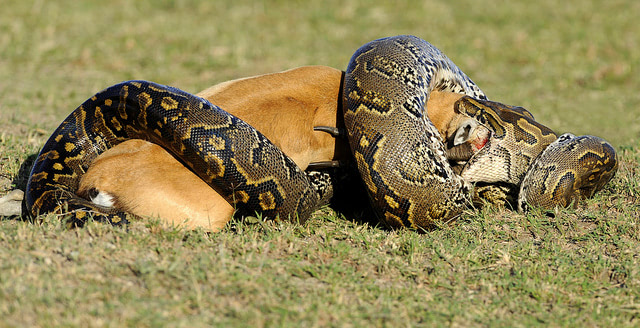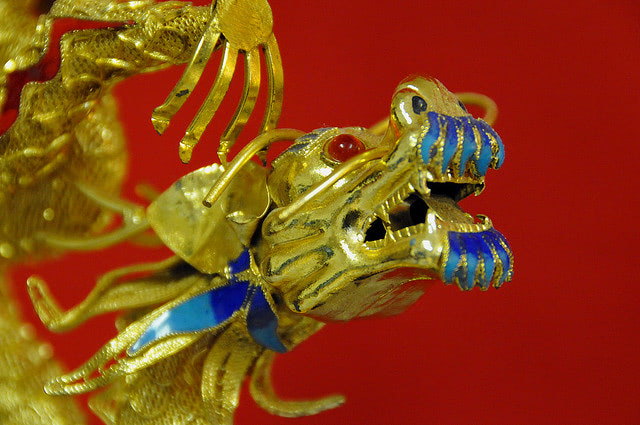This last Monday rang in the Chinese Year of the Dragon. Not restricted just to the benevolent, snake-like creature of Chinese mythology, or to the greedy, princess-stealing monster from Europe, dragon-like creatures occur throughout the world. Legendary reptiles occur as far apart as the feathered snake of Precolombian America and the rainbow serpent of Aboriginal Australia. It may be that, like flight in bats, pterosaurs and birds, the dragon "evolved" multiple times independently throughout human mythology.
If, indeed, the dragon can be considered a cultural universal – it may be that "large scaly monster" is too general a category to be meaningful – several theories purport to explain their origin. Giant reptiles like the crocodile or monitor lizard are obvious suspects. It's easy to imagine how word-of-mouth could transform an already terrifying beast into something that flies or breathes fire. Dinosaur bones may have inspired other dragon myths, while the rotten carcasses of sharks and whales are even today routinely mistaken for sea monsters. By far the most interesting theory is that of anthropologist David E. Jones, who argues that dragons are a mash-up of the predators that ate our distant primate ancestors. Dragons prey on what we're genetically primed to fear.
Jones argues that the fear of predatory cats, wolves, snakes, hawks and eagles became hardwired in the primate psyche. Small tree-dwelling primates had to keep one eye out for death from above or below. Our hominid ancestors, even once they became physically larger and moved to the savannah, still had plenty of poisonous and sharp-toothed predators to contend with.
According to Jones' book An Instinct for Dragons, the innate primate fear of bigs cats, raptors and snakes is the subconscious force beneath the chimeric dragon. While the theory is fascinating, there does not seem to be much evidence that monkeys and apes are innately afraid of cats and predatory birds – they do, course, exhibit very strong learned aversion to predators. Where Jones' hypothesis is strongest is when it comes to the fear of snakes.

All primates, from humans to baboons, may share a genetic "fear module" that activates an aversion to snakes. Just as dough needs heat to become bread, primates seem to need social cues as a catalysis to "bake" their latent fear of snakes. Captive-raised macaques, for instance, will treat a rubber snake with as much concern as a fallen twig. However, if the same macaques watch a video of other monkeys mobbing and screaming at a snake, they almost instantaneously acquire a crippling fear of any snake, real or rubber.
In case this just sounds like a normal case of monkey-see, monkey-do, snakes are unique as fear stimuli. A macaque that observes another macaque that is terrified of, say, a flower, will not immediately learn to fear flowers. A snakes' skinny form and slithery movement triggers a fear that flowers do not.* Whether or not you're terrified of snakes is a nature-and-nature process of socialization combined with genetic variation. On a basic level, it's safe to say that humans are wired with the same aversion to snakes as lower primates.
While Jones' hypothesis is far from perfect, it's an intriguing addition to the standard evolutionary psychology narrative that "men want sex, women want babies". Maybe we're not mere sex machines, but fear driven sex machines. Joking aside, Jone's book raises the interesting point that the Jungian archetypes of mythology could have a basis in ancient hominid history. Over time, our primal fear of the snake may have translated to awe and respect, giving rise to the god Quetzacoatl in Mesoamerican cultures, or the imperial dragon in China. Snakes make nature scary, but dragons make nature sublime.
*This may explain why a phobia of snakes is so common, and a phobia of guns so uncommon. Although a human is far more likely to encounter a gun-toting criminal than a hungry python, guns haven't been around long enough to be encoded into a fear module.
Dragon tidbits via Surprising Science. Photo via Archer10 and RayMorris1 Flickr.

Loys Johnson
I have python and it. teel me more abone python snake
Posted on